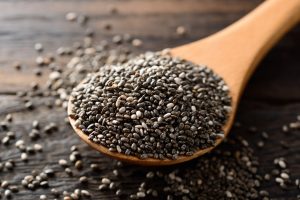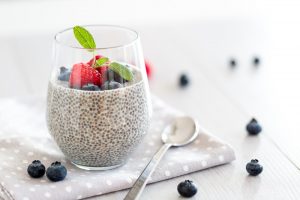With so much talk about superfoods in the media today it can be confusing knowing which foods you should include in your diet and why. Remember, even when you’re on a low cal diet the the 500 or 800 calorie diet, it is important that you get the right nutrients.
In this article we’ll take a look at chia seeds including:
- An overview of what chia seeds are and their nutritional benefits
- How you can use chia seeds for weight loss
- How to eat them

What is Chia?
Chia seeds are tiny, oval shaped grains that pack a powerful nutritional punch. This edible seed is derived from the plant Salvia Hispanic, which has been cultivated in the Mexican desert for thousands of years. Traditional consumption of chia seeds dates back to Mayan and Aztec culture. Chia seeds are growing in popularity and are considered a ‘superfood’ that can promote optimal health and weight loss.
Chia seeds Nutritional Composition
For every ounce of Chia seed (28 g or approximately 2 tbsp):
- 16-26% (5.6 g) of protein
- 31-34% (8.4 g) of fat
- 37-45% (24 g) of carbohydrates in total, 23-35% (11g) of total dietary fiber
- Source of minerals (calcium, phosphorus, potassium and magnesium, copper)
- Vitamins (thiamine, riboflavin, niacin, folic acid, ascorbic acid and vitamin A)
- Antioxidant compounds (chlorogenic acid, quercetin caffeic acid)
Why eat Chia?
Scientists have taken note that Chia seeds are high in omega 3 fatty acids, fiber and a good source of plant based protein, minerals and antioxidants. These active components have been shown to have multiple health benefits including:
- Improving cardiovascular health
- Reducing complications associated with diabetes
- Promoting weight loss
Cardiovascular Health
Omega 3
Approximately 75% of the fat found in the chia seed exist as omega 3 fatty acid. The most predominate form as alpha linoleic acid. Alpha linoleic acid is an essential fatty acid that the body readily needs and is unable to produce on its own. Omega 3 fatty acids are known to have anti-inflammatory effect. Chronic inflammation is considered a precursor to poor vascular health and may lead to risk of heart attack and or stroke. Chia seed consumption has shown to reduce cardiovascular risk factors (7).
Cholesterol is another risk factor that can influence cardiovascular health. Omega 3 consumption has also shown to alter cholesterol profile among individuals. The high level of omega 3 and favourable ratio of omega 3: omega 6 -fatty acid content in chia seeds can increase levels plasma HDL (the good cholesterol) and lower the LDL level (the bad cholesterol), improve endoethial wall health, and reduce plaque build-up in arteries (7)
Fiber
Chia seed’s high fiber content can also lower overall cholesterol levels. Fiber binds to free cholesterol and removes it from the body. Typically, every 2 g of soluble fiber added in a diet can result in 1% drop in LDL cholesterol levels (1). A serving of chia seed contains 11 g of fiber, making it an excellent choice to help improve cholesterol levels.
Minerals and antioxidants
Chia seeds contain the following minerals that have shown to improve cardiovascular health (7):
- Copper – shown to improve heart health and is often limiting in our diet
- Chlorogenic acid– a powerful antioxidant known to reduce blood pressure
- Caffeic acid – shown to reduce inflammation
- Quercetin – shown to reduce cardiovascular risk
Diabetes
Chia seeds can aid in improving health risks associated with diabetes. Diabetes is the inability to regulate the metabolism of sugar in body, which can result in spikes and drops in blood sugar levels.
Improve blood sugar levels
In both animal and human investigations, chia seed consumption has been shown to reduce post meal blood sugar levels (4,5). Fiber in the chia seeds are known to slow the digestive progress and therefore reduce the conversion of carbohydrate to sugars in the blood. Chia seeds are considered a low glycemic food and beneficial to those that need to regulate their blood sugar level
Improve Insulin resistance
Insulin is the hormone that regulates the uptake of sugar from the blood. Diabetes is characterized by an inability for the body to respond to this hormone, thus blood sugar is unregulated. Studies have shown that chia seeds have improved the insulin resistance in animals fed extremely high sugar diets (6,8). Although it remains unclear as to how insulin resistance develops in diabetes, there has been associations made with inflammation and oxidative stress. Chia seeds antioxidants and omega 3 can reduce inflammation and oxidative stress leading to insulin resistance (7).
Chia seeds for weight loss
There have been a few clinical trials evaluating weight loss among humans with chia seed consumption. Consuming 35g of a chia flour for a period of 12 weeks produced significant weight loss in overweight individuals and even greater weight loss in obese subjects (9). In a more recent study, obese patients with type 2 diabetes experienced significant waist circumference reduction and decrease in appetite when 30 g/1000kcal of chia (10).
Chia seeds help to promote weight loss in several ways including:
Fiber
The high fiber content gives the feeling of fullness longer. The seed physiologically can absorb 9 times its weight in water, forming a gel. When consumed with liquid the seed expands and can physically fill you faster on less calories and therefore reduce total food intake. The high fiber content of the seed also provides a low glycemic index, meaning food is digested slower and thus produce less spikes in blood sugar. Drops in blood sugar signal the brain to release hormones that regulate hunger. Studies have shown subjects that consumed chia seeds felt less hungry than control subjects over a period of 120 min (11).
Protein and calcium
Compared to other grains Chia seeds are high in complete protein (9). Protein consumption is associated with higher satiation and decreased food intake (2). Chia seeds are also an excellent source of calcium. For every ounce of chia seed there is 126 mg of calcium which is 18 % of your recommended daily dosage. Studies have associated calcium supplementation with fat and weight loss (3).
Energy Boosting properties
Chia seeds have been traditionally used for energy boosting properties (7). Clinical studies have shown chia seed as a means to boast performance among athletes. Subjects were able to perform endurance exercises longer than the control group (11). Performance enhancement properties can therefore encourage healthy weight maintenance.

Chia seeds can be mixed into healthy breakfasts or deserts
How to eat chia seeds
The seed is small, has a pleasant nutty flavor, and unlike other seeds it is easier for the body to digest. Chia can be easily added to foods and mixed into drinks. Recommended dosages vary from 28 g to 30 g day. There are several low calorie breakfast ideas that include chia seeds.
Over all chia seeds promote optimal health. Chia seeds may be small but it is mighty when it comes to nutritional impact on improving heart health, diabetes and weight loss.



